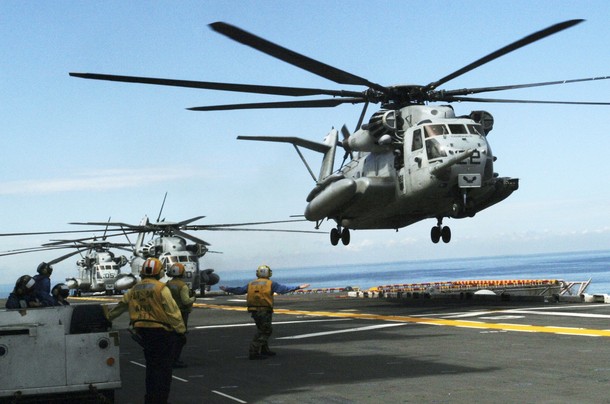
From Thom Shanker, the New York Times: American military planners are sifting through a range of options as the United States, like other Western nations, weighs the response to the bloody Libyan military assaults on rebels trying to oust Col. Muammar el-Qaddafi.
Rebel commanders have begged for American strikes on troops and weapons that have turned on civilians and assaulted strongholds of the resistance. And on Sunday, three influential members of the United States Senate, from both parties, renewed the call for a no-flight zone to ground the Libyan Air Force and prevent it from attacking its people. They also pressed the Obama administration for a more aggressive response, including supplying intelligence, arms and training to the rebels.
The defense secretary, Robert M. Gates, and top commanders have warned of political fallout if America again attacks a Muslim nation, even to support a popular revolt. So military planners on the Pentagon’s Joint Staff and in its field commands are offering a broad range of approaches, depending on how events play out in Libya and how tough the United States and its allies want to be.
Even without firing a shot, a relatively passive operation using signal-jamming aircraft in international airspace could muddle Libyan government communications with military units. Administration officials said Sunday that preparations for such an operation were under way.
The latest military force to draw within striking distance of the Libyan capital, Tripoli, is the 26th Marine Expeditionary Unit aboard two amphibious assault ships, the Kearsarge and the Ponce. The unit provides a complete air, sea and land force that can project its power quickly and across hundreds of miles, either from flat-decked ships in the Mediterranean Sea or onto a small beachhead on land. …
Another tactic would be to air-drop weapons and supplies to rebels, an idea floated Sunday by Stephen Hadley, who served President George W. Bush as national security adviser.
“If there is a way to get weapons into the hands of the rebels, if we can get antiaircraft systems so that they can enforce a no-fly zone over their own territory, that would be helpful,” Mr. Hadley said on “State of the Union” on CNN.
Other options include inserting small Special Operations teams, perhaps just a dozen soldiers, to assist the rebels, as was done in Afghanistan to topple the Taliban.
The teams are specially trained to turn ragtag rebel groups almost overnight into more effective fighters, with a modest infusion of know-how, equipment and leadership. (photo: Reuters)
Image: reuters%203%207%2011%20USS%20Kearsarge%20helicopter.jpg
